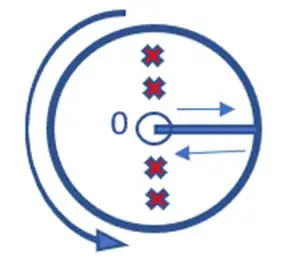Let's consider $$I(k,q)=\int_0^\infty\frac{\sin^k(x)}{x^q}dx$$ where $k$ is positive integer and $q$ is rational (not necessarily an integer).
Using the formula $\frac{1}{x^q}=\frac{1}{\Gamma(q)}\int_0^\infty{t}^{q-1}e^{-xt}dt$
we get $I(k,q)=\frac{1}{\Gamma(q)}\int_0^\infty{t}^{q-1}dt\int_0^\infty\sin^k(x){e}^{-xt}dx$, where $\Gamma(x)$ is Gamma-function.
Integrating by part and grouping the terms with the same power of $\sin(x)$ we can get that
$$I(k,q)=\frac{k!}{\Gamma(q)}\int_0^{\infty}\frac{t^{q-2}}{(t^2+2^2)(t^2+4^2)...(t^2+k^2)}dt, k=2n, q>1, n=1, 2,3...$$
$$I(k,q)=\frac{k!}{\Gamma(q)}\int_0^{\infty}\frac{t^{q-1}}{(t^2+1^2)(t^2+3^2)...(t^2+k^2)}dt, k=2n-1, q>0, n=1, 2,3...$$
To evaluate the integrals let's consider the following contour: along the cut from $0$ to ${\infty}$ (along the $X$ axis), big circle of radius $R$ (counter clockwise), along the other bank of the cut back to $0$ and along a small circle $r$ around $0$ (around a brunch point of $t^q$ - $q$ is rational) to the starting point.

Making a full round in the positive direction, on the lower bank of the cut the integrand gets additional factor $e^{2\pi{iq}}$. Integral along this closed contour is equal to the sum of residuals in simple poles, and integrals along big and small circle set to zero as $R\to\infty$ and $r\to0$. So,
$$I(k,q)(1-e^{2\pi{iq}})=2\pi{i}\frac{k!}{\Gamma(q)}\sum{Res}\frac{t^{q-2}}{(t^2+2^2)(t^2+4^2)...(t^2+k^2)}, k=2n$$
$$I(k,q)(1-e^{2\pi{iq}})=2\pi{i}\frac{k!}{\Gamma(q)}\sum{Res}\frac{t^{q-1}}{(t^2+1^2)(t^2+3^2)...(t^2+k^2)}, k=2n-1$$
Finally, for even ($k=2n$), $q>1$ ($q$ - rational); $a=2, b=4, ...=k$
$$I(k,q)=\frac{-\pi{k!}}{2\Gamma(q)\cos\frac{\pi{q}}{2}}\left(\frac{a^{q-3}}{(b^2-a^2)(c^2-a^2)..(k^2-a^2)}+\frac{b^{q-3}}{(a^2-b^2)(c^2-b^2)..(k^2-b^2)}+..\right)$$
Or, after slight further simplification,
$$I(k,q)=\frac{-\pi{k!}2^{q-2n-2}}{\Gamma(q)\cos\frac{\pi{q}}{2}}\left(\frac{a^{q-3}}{(b^2-a^2)(c^2-a^2)..((\frac{k}{2})^2-a^2)}+\frac{b^{q-3}}{(a^2-b^2)(c^2-b^2)..((\frac{k}{2})^2-b^2)}+..\right)$$ where $a=1, b=2, c=3…=\frac{k}{2}(=n)$
For odd ($k=2n-1$), $q>0$, $a=1, b=3, ...=k$
$$I(k,q)=\frac{\pi{k!}}{2\Gamma(q)\sin\frac{\pi{q}}{2}}\left(\frac{a^{q-2}}{(b^2-a^2)(c^2-a^2)..(k^2-a^2)}+\frac{b^{q-2}}{(a^2-b^2)(c^2-b^2)..(k^2-b^2)}+..\right)$$
The formulas are practical for calculations, and any integral $I(k,q)=\int_0^\infty\frac{\sin^k(x)}{x^q}dx$ for not too big integer $k$ can easily be evaluated.
Just few examples:
- $I(k=4,q=2)=\int_0^\infty\frac{sin^4(x)}{x^2}dx$,
$k=4$ ($k$ is even), and we have only $a=2, b=4$. Therefore,
$$I(4,2)=-\frac{\pi{4!}}{2\Gamma(2)\cos\frac{\pi{2}}{2}}\left(\frac{2^{-1}}{(4^2-2^2)}+\frac{4^{-1}}{(2^2-4^2)}\right)=\frac{12\pi}{4^2-2^2}(\frac{1}{2}-\frac{1}{4})=\frac{\pi}{4}$$
- $I(k=4,q=4)=\int_0^\infty\frac{\sin^4(x)}{x^4}dx=-\frac{4!\pi2^2}{2^4\Gamma(4)}\left(\frac{1}{2^2-1^2}+\frac{2}{1^2-2^2}\right)=-\frac{\pi}{3}(1-2)=\frac{\pi}{3}$
- $I(k=3,q=\frac{1}{2})=\int_0^\infty\frac{\sin^3(x)}{\sqrt{x}}dx=\frac{6\pi\sqrt{2}}{2\sqrt{\pi}}\left(\frac{1^-\frac{3}{2}}{3^2-1^2}+\frac{3^-\frac{3}{2}}{1^2-3^2}\right)=-\frac{\sqrt\pi}{4\sqrt6}(3\sqrt3-1)$
- $I(k=5,q=\frac{3}{2})=\int_0^\infty\frac{\sin^5(x)}{x^\frac{3}{2}}dx=\frac{5!\pi}{2\Gamma(\frac{3}{2})\sin\frac{3\pi}{4}}\left(\frac{1}{\sqrt1(3^2-1^2)(5^2-1^2)}+\frac{1}{\sqrt3(1^2-3^2)(5^2-3^2)}+\frac{1}{\sqrt5(1^2-5^2)(3^2-5^2)}\right)=\sqrt{\frac{5\pi}{2}}\frac{2\sqrt5-\sqrt15+1}{24}$
- At some $q$ there are uncertainties (when $\cos\frac{\pi{q}}{2}$ or $\sin\frac{\pi{q}}{2}=0$ in the denominators) that need to be evaluated. For instance, $I(k=3,q=2)=\int_0^\infty\frac{\sin^3(x)}{x^2}dx$. We have $a=1, b=3$, we set
$q=2+\epsilon$ and $$I(3,2)=\lim_{\epsilon\to0}\frac{6\pi}{2}\frac{1}{\sin\frac{\pi(2+\epsilon)}{2}}\left(\frac{1^\epsilon}{3^2-1^2}+\frac{3^\epsilon}{1^2-3^2}\right)=$$$$=-\lim_{\epsilon\to0}\frac{6}{\epsilon}\left(\frac{1^0}{3^2-1^2}+\frac{\epsilon\log(1)}{3^2-1^2}+\frac{3^0}{1^2-3^2}+\frac{\epsilon\log(3)}{1^2-3^2}\right)=\frac{3\log3}{4}$$
